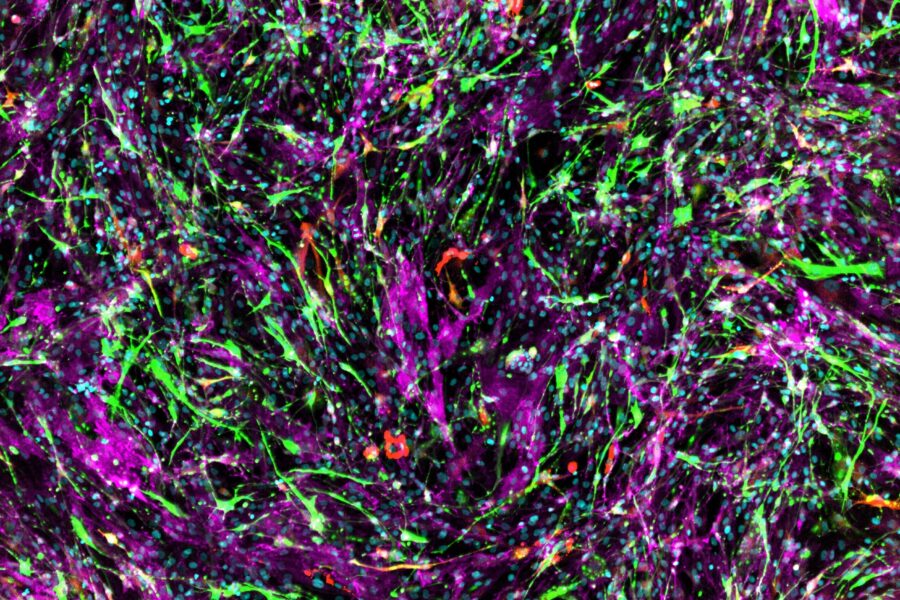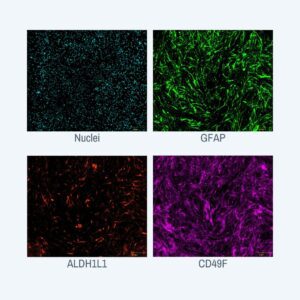An Indispensable Tool for Modern Biotechnology
Immunocytochemistry (ICC)

iPSCs are a promising model for human biology, with the ability to differentiate into hundreds of cell subtypes for groundbreaking work in pharmaceutical research, academic investigation, and biotechnological innovation. A comprehensive grasp of immunocytochemistry offers a method to visualize proteins and other antigens within iPSC-derived cells, allowing one to characterize these differentiated cells. This page explores immunocytochemistry, shedding light on how industry leaders, including Elixirgen Scientific, employ it to pioneer advances.
What is Immunocytochemistry and Why Use It?
Immunocytochemistry is a pivotal laboratory technique tailored to visually pinpoint cellular components, such as proteins and antigens, within cell cultures or tissue sections using antibodies that bind to them.
Why ICC?
- Precision: Our ICC technique enables the detection and quantification of specific neuronal markers. For instance, observing the expression of VGLUT1, a key marker for excitatory neurons, allows us to ensure quality and specificity in our various cell types.
- Diversity: ICC is instrumental across various domains of neuronal research. Whether it's studying synaptic proteins like PSD-95, identifying specific neurotransmitter-producing neurons via enzymes like tyrosine hydroxylase (for dopaminergic neurons), or visualizing axonal proteins like neurofilament, ICC provides invaluable insights into neuronal characterization.
- Flexibility: ICC is adaptable for samples differentiated to almost any cell type and from any iPSC line.
ICC's Integral Role in iPSC Differentiation
Induced pluripotent stem cells (iPSCs), with their promise to morph into any cellular lineage, present boundless potential. ICC assists researchers in confirming the differentiation of iPSCs into target cells, such as excitatory neurons, by identifying characteristic proteins like VGLUT1 (vesicular glutamate transporter 1).
Elixirgen’s Multifaceted Use of ICC
Elixirgen Scientific employs immunocytochemistry (ICC) as a fundamental tool for our research, product development, and more. Below, we outline the key applications of immunocytochemistry:
- Verification of Pluripotency: By visualizing proteins like OCT3/4, pluripotency is confirmed.
- Determining Differentiation Success: Markers like VGLUT1, in the case of excitatory neurons, help ensure endodermal differentiation has been successful.
- Quality Control: Rigorous imaging and validation help to ensure our products meet our quality standards.
- Confirmation of Neuronal Identity: Identifying specific marker expression validates neuronal differentiation into your desired cell type.
- Disease phenotype detection: Identifying markers such as TDP-43 gives insights into conditions like ALS.
Elixirgen Scientific Service Details
We pride ourselves on offering a comprehensive suite of services tailored to meet the diverse needs of our clients in the biotechnology and pharmaceutical sectors. From cutting-edge laboratory facilities to unparalleled client support, our offerings are curated to deliver accuracy, efficiency, and innovation in equal measure. Below is an overview of the key features that distinguish our services:
- Equipment and Resources: Facilities equipped for multiplex ICC, enabling visualization of multiple proteins simultaneously—vital for comprehensive drug target analysis.
- Robust Antibody Validation Process: By using secondary antibodies conjugated with distinct fluorophores, specificity is enhanced.
- Efficiency: Streamlined processes that save time without compromising on quality.
- Client Support: We accompany you through the lifecycle of your project, providing expert insights on data analysis, hands-on assistance with cell culture, and prompt answers to any queries.
- Scalability: Catering to projects of all sizes, from boutique requirements to large-scale operations.
- Cost-effectiveness: Providing top-notch services at competitive price points.
- Access to CIRM Cell Lines: These cell lines, including both disease affected and healthy control donors, provide a wide array of relevant models for neurodegenerative diseases, including Alzheimer’s Disease.
Quality Assurance & Turnaround Time
- Fast Turnaround Time: Rapid processing without sacrificing precision.
- Within a week, we can run ICC assays and analyze results
- Optimized Process: We've standardized our methods over years of rigorous research, ensuring you receive results of unmatched consistency and reliability.
- Comprehensive documentation: Our user guides are meticulously crafted, ensuring each step is clear, concise, and easily replicable. Whether you're a seasoned researcher or just getting started with ICC, our guides act as a beacon, simplifying complex procedures and providing clarity.
- Transparency with QC Process: Setting thresholds, for instance, ensuring that a marker like TUBB3 meets specific expression criteria.
Immunocytochemistry Resources
ICC Application Protocols:
Immunofluorescence Microscopy with iPSC-Derived Excitatory Neurons in a 96-Well Plate
ICC Webinars:
Human iPSC-Derived Neuromuscular Research & Transcription Factor-Based iPSC Differentiation
Tools to Study Neurodegeneration: iPSC-Derived Neurons, Nerve Organoids,
& Synaptogenesis Beads
ICC Application Notes:
Genetic and Functional Profiling of hiPSC-derived Excitatory Neurons Differentiated by Quick-Neuron™ Technology
ICC Posters:
Functional Evaluation of iPSC-Derived Astrocytes Generated by a Rapid Differentiation Method (Neuro 2022 Japan)
Functional and Pharmacological Evaluation of iPSC-Derived Astrocytes Generated by a Rapid Differentiation Method (Society for Neuroscience 2022)
Enhance Your Immunocytochemistry Assays Today
Elixirgen Scientific, Inc.
Science and Technology Park at Johns Hopkins
855 N. Wolfe St., Suite 631
Baltimore, MD 21205


